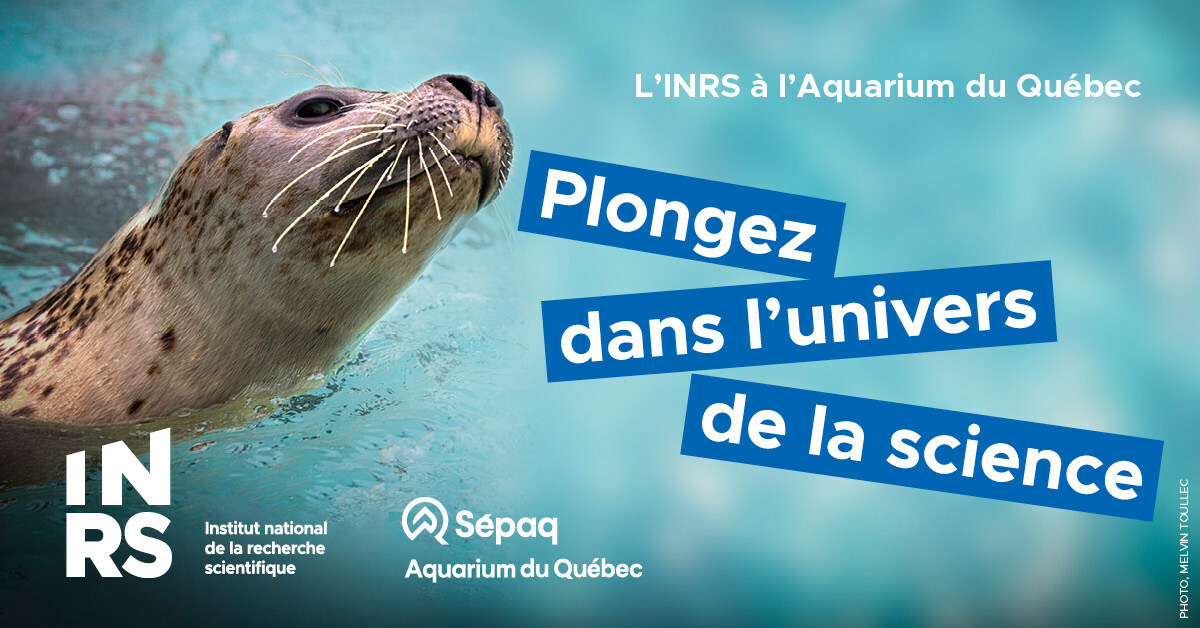QUEBEC CITY, Oct. 11, 2023 /CNW/ – For the third year in a row, the National Institute of Scientific Research (INRS) and the Aquarium du Québec are offering the public a series of interactive workshops to introduce science to the young and less young. This collaboration supports one of the Aquarium’s missions: raising public awareness about biodiversity conservation.
In October, discover the conservation of aquatic ecosystems by attending workshops organized by INRS at the Aquarium du Québec. (CNW Group/National Institute of Scientific Research (INRS))
Over two weekends in October, members of the INRS student and scientific community will lead science popularization workshops on the aquarium grounds. These aim to inform and raise public awareness about coastal erosion, melting ice, protecting fish and their habitat, and even water quality in bodies of water. These activities are made possible by the participation of Professors Anne Crémazy, Eva Enders, Louise Hénault-Ethier and Professors Jérôme Comte, Jacob Stolle and Yves St-Pierre.
The interactive INRS workshops are included in the price of the day ticket for visiting the aquarium. To reserve your tickets.
Sustainable management of ecosystems
Two workshops on the topic of fish and environmental protection will be offered on October 14th and 15th, 2023.
Schedule and information
- Protection of fish and their habitat: Learn about protecting and restoring fish habitat and the methods scientists use to study it. Interactive demonstrations give you the opportunity to try out the use of different fishing tackle.
- The role of phytotechnologies in sustainable water management: Discover phytotechnologies, innovative solutions for environmental protection and the sustainable management of our natural resources. From green walls and roofs to filter swamps, discover these ecological approaches in a fun way by creating your own 3D model of phytotechnology.
Health of aquatic ecosystems
Six workshops on “Promoting the health of aquatic ecosystems and organisms” will be offered on October 21 and 22, 2023.
Schedule and information
- Coastal erosion: The banks of the St. Lawrence River are an integral part of Quebec, shaped over millennia by the interaction between water and land. Join us for an immersive experience that will allow you to closely observe the coastal phenomena that affect our coasts. With the help of a small wave channel with agitators and an artificial beach, you could even experience a miniature tsunami simulation.
- Cyanobacteria: what are they? : Discover cyanobacteria, microorganisms that appeared more than 3 billion years ago and are responsible for the presence of oxygen in the atmosphere. Discover their history through unique fossils and living species of cyanobacteria. Observe their appearance, explore their smell and learn about the interactions and importance of cyanobacteria in Quebec’s aquatic ecosystems.
- Melting ice – a worrying phenomenon : Use an Arctic model and experiments to explore changes to the Arctic landscape threatened by global warming. Rising temperatures are causing permafrost, once permanently frozen ground, to melt, releasing organic matter and pollutants into aquatic ecosystems. Thanks to a plasticine model, you can concretely observe the changes in the Arctic landscape.
- The mixing of water in lakes as a function of seasonal temperature fluctuations: Each summer, when the surface of lakes warms faster than the ground, water circulation changes, preventing warm water at the surface from mixing with the colder layer at depth. In the fall, the surface cools and mixes with the soil, where most nutrients are concentrated. Although the surface freezes in winter, the temperature difference between the surface and the ground is smaller than in summer. In spring, the thaw causes the ground and surface to mix again. Discover the difference in density between hot and cold water by participating in this experiment.
- Keeping aquatic organisms healthy: Immerse yourself in the fascinating world of aquatic organisms, whose health is vital and often endangered. This workshop provides microscopic observation of zooplankton, phytoplankton and limnea eggs. You will also have the opportunity to participate in an interactive table highlighting beneficial and harmful effects for these organisms. Plus, learn how acid can threaten their survival by measuring acid levels in various solutions using pH strips. Prepare for an enriching educational experience where you will discover how you can contribute to the well-being of aquatic organisms.
- Health of Marine Species in the Gulf of St. Lawrence: Immerse yourself in the heart of the Gulf of St. Lawrence with this workshop that invites you to explore the health of marine animals. Discover a range of state-of-the-art laboratory equipment for analyzing the blood of these species. From a single drop of blood, it is possible to assess their health, detect pathogenic bacteria and measure the long-term effects of climate change on fish populations.
About INRS
The INRS is a university institution dedicated exclusively to research and graduate education. Since its founding in 1969, it has actively contributed to Quebec’s economic, social and cultural development. In Quebec and Canada, the INRS ranks first in terms of research intensity. It consists of four interdisciplinary research and training centers in Quebec, Montreal, Laval and Varennes, which focus their activities on strategic sectors: water, land, environment, energy, materials, telecommunications, urbanization culture society and Armand Frappier health biotechnology. Its community includes more than 1,500 students, postdoctoral fellows, faculty members and staff.
SOURCE National Institute for Scientific Research (INRS)

Information: Source: Julie Robert, Department of Communications and Public Affairs, National Institute of Scientific Research (INRS), [email protected]514 971-4747

